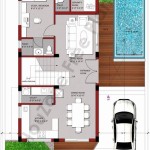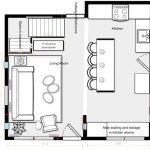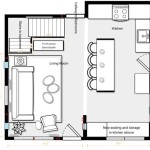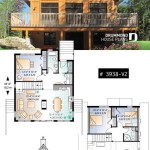Gropius House Plan Drawing: An In-Depth Look
The Gropius House, located in Lincoln, Massachusetts, stands as a significant example of Bauhaus architecture in the United States. Designed by Walter Gropius, the founder of the Bauhaus school, the house served as his family's residence after he emigrated from Germany in 1937. Studying the Gropius house plan drawings provides valuable insights into the principles of Bauhaus design and its adaptation to the American context.
The plan drawings reveal a clear emphasis on functionalism, a core tenet of the Bauhaus philosophy. Spaces are designed for efficient living, with each room serving a specific purpose. The open plan layout encourages a flow between living areas, fostering a sense of community and interaction. The drawings clearly delineate the different zones within the house, highlighting the connection between interior and exterior spaces.
One key feature evident in the Gropius house plan drawing is the use of modularity. The design employs a standardized grid system, influencing the placement of walls, windows, and other structural elements. This modular approach reflects the Bauhaus emphasis on rational design principles and the potential for prefabrication. It also allowed Gropius to integrate industrial materials like glass block and steel alongside traditional materials such as brick and wood.
The drawings showcase the careful consideration given to the relationship between the house and its surroundings. Large windows, strategically placed throughout the house, maximize natural light and provide views of the surrounding landscape. The integration of outdoor spaces, such as terraces and balconies, further blurs the line between inside and outside. This connection to nature was a vital element of Gropius's design philosophy, emphasizing the importance of harmony between the built environment and the natural world.
Analysis of the floor plans reveals the functional organization of the house. The ground floor houses the main living spaces, including the living room, dining room, and kitchen. These areas are interconnected, creating a fluid and open living environment. The first floor accommodates the private spaces, such as bedrooms and bathrooms. The drawings meticulously detail the dimensions and layout of each room, illustrating the efficient use of space.
The Gropius house plan drawing also reveals the innovative use of materials and construction techniques. The house incorporates a combination of traditional New England building materials, such as wood and fieldstone, with modern industrial materials like glass block and steel. This juxtaposition of materials reflects Gropius's desire to integrate modern design principles with the local vernacular. The drawings provide detailed specifications for these materials, offering insights into the construction process.
Beyond the functional layout and material choices, the Gropius house plan drawing reveals a deep concern for aesthetics. The design emphasizes clean lines, geometric forms, and a minimalist aesthetic. The careful placement of windows and doors creates a balanced and harmonious composition. The drawings capture the essence of Bauhaus design, showcasing the integration of form and function.
Studying the different elevations and sections in the Gropius house plan drawing provides a more comprehensive understanding of the building's three-dimensional form. These drawings illustrate the relationship between different levels of the house and showcase the interplay of solid and void. They also offer valuable information about the building's structural system and the integration of building services.
The detailed construction drawings within the Gropius house plan set provide specific instructions for the building process. These drawings include detailed information about wall assemblies, roof construction, and other technical aspects of the building. They serve as an invaluable resource for understanding the technical execution of Gropius's design vision.
The Gropius House plan drawings offer more than just a blueprint for a building; they provide a window into the mind of a master architect. They demonstrate the practical application of Bauhaus principles and the integration of modern design into a specific context. The drawings remain a valuable resource for architects, students, and anyone interested in understanding the evolution of modern architecture.
The influence of the Gropius House extends beyond its physical presence. The house served as a prototype for modern residential design, influencing subsequent generations of architects. Its principles of functionalism, modularity, and integration with nature continue to resonate in contemporary architecture. The Gropius house plan drawing serves as a lasting testament to the enduring power of Bauhaus design.
Accessing and studying the Gropius house plan drawings provides a unique opportunity to delve into the design process of a significant architectural landmark. These drawings offer a wealth of information, revealing the careful consideration given to every detail of the house, from its overall layout to the selection of materials. They provide a valuable resource for understanding the principles of Bauhaus design and its adaptation to the American context.

Gropius House In Lincoln By Walter Archeyes

Gropius House In Lincoln By Walter Archeyes

Gropius House 1st Floor Modern Plan Must Know Moderns Plans Walter

Ad Classics Gropius House Walter Plans

Gropius House Model Plan Walter

Modern Floor Plans Gropius House

Pa3 Views Iar Gabi Petrulis

Act Image Popup

Must Know Modern Homes Gropius House

Second Floor Plan Of The Gropius House Scientific Diagram








